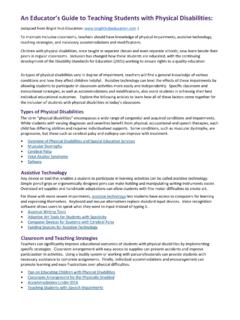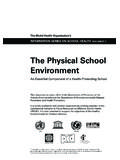Transcription of In Support of Educators: Strategies That Work
1 4% In Support of educators : Strategies that WorkKim ElliottJessica JuliusonNevin KatzJohn ParrisEducation Development Center Suggested citation:Elliott, K., Juliuson, J., Katz, N., & Parris, J. (2021). In Support of educators : Strategies that work . Waltham, MA: credits:Burt Granofsky (cover, pgs. 3, 6, 7-top, 9, 11-12); Getty Images (pgs. 2, 4, 7-bottom, 8, 10)Copyright 2021 by Education Development CenterEDC designs, implements, and evaluates programs to improve education, health, and economic opportunity worldwide. For more information, visit In Support of educators : Strategies that WorkEDC | iii Table of ContentsIntroduction: educators and EDC ..1 Focus on Teaching: Realistic, Targeted Human Support ..4 Supporting Connected educators ..7 Some Thoughts on Software for Teachers ..10 Sampler of EDC s Free Professional Learning Resources ..134% In Support of educators : Strategies that WorkEDC | 1 Introduction: educators and EDC By Kim Elliott Every day, an educator makes a difference in the life of a student.
2 In partnership with families, they ignite a love for lifelong learning. With community and industry partners, they pave the way to career success. Right now, as you read this sentence, a teacher is thinking about, preparing to teach, listening to, or talking with a student. Thirty years from today, that student will remember what he or she learned from the teacher. Beyond recalling the facts and skills he or she acquired, the student will continue to draw strength from the teacher s Support . The positive effects of a dedicated teacher circle outward like the waves that form when you drop a rock into a pond. Unlike the fleeting, surface ripples caused by a rock, a teacher s influence is deep and enduring. Over decades, the effects of dedicated teachers flow and grow in students, fellow teachers, school and district leaders, families, and communities. Teachers Support of preK-12 students, and the lasting effects of that Support , is one of the most powerful factors in shaping a country s future.
3 Their work is as complex and challenging as it is critical. Each student brings a wide range of ever-evolving strengths and needs. Each school and district has an ever-shifting landscape of priorities and pressures. Amidst it all, how can we Support those who help foster the future? Without question, respect, recognition, and compensation for teach-ers hard and often heroic work are key. Teachers also need access to high- quality instructional resources, as well as time and Support to engage in ongoing profes-sional development. EDC has worked to meet these needs for over 60 years. EDC designs and delivers effective professional learning programs and resources that help educators across the and around the world close opportunity gaps and improve outcomes for students. Our Support for educators is evidence-based, impactful, and produces real results for students (learn more about our results by exploring descriptions of some of our projects).
4 Many of our staff are fomer teach-ers, and we know that one-size-fits-all approaches to professional development end up fitting no one. So, our Support for educators looks very different based on learners unique contexts and needs. Some common formats include the following: Face-to-face institutes, seminars, courses, workshops, and instructional coaching Facilitated technology-enhanced learning including facilitated online courses, interactive audio instruction, webinars, online coaching programs Free self-guided online courses, toolkits, and resource hubs Published guides and multi-media programsThe positive effects of a dedicated teacher circle outward like the waves that form when you drop a rock into a pond. Unlike the fleeting, surface ripples caused by a rock, a teacher s influence is deep and enduring. Over decades, the effects of dedicated teachers flow and grow in students, fellow teachers, school and district leaders, families, and In Support of educators : Strategies that WorkEDC | 2 Consultation to build the capacity of administrators to serve as instructional leaders and professional development leaders Professional learning experiences that draw upon several of the above approachesNo matter what the format looks like, our professional learning programs and resources.
5 Are designed and tested with substantial input from educators Focus on rigorous, evidence-based content in all academic subjects and areas pivotal to optimal learning (physical health, mental health, safety) Build the capacity of educators at all grade levels (preschool to beyond high school) and in school and in out-of-school settings Offer effective Strategies to Support the success of emergent multilingual learners, learners with disabilities, and learners from economically disad-vantaged and historically disenfranchised groups Prepare educators to draw on data and formative assessment to guide and refine their work with children and youth Foster collaboration ( , professional learning communities, instructional coaching) to sustain job-embedded learning Give educators opportunities to immediately apply their new knowledge, skills, and Strategies with children and youth 4% In Support of educators : Strategies that WorkEDC | 3 Engage educators in active learning, including having them tackle the same investigations, challenges, and projects they will use in classrooms and programs Reflect our respect for educators , the expertise that they bring, and the key role they play in the lives of children and youthIn the pages that follow, three of EDC s professional learning experts Jessica Juliuson (a former social studies teacher), Nevin Katz (a former science teacher), and John Parris discuss key considerations in supporting teachers.
6 Each expert brings a unique perspective and set of lessons learned. Yet the core elements of our approach are evident in the writing of all three, as is EDC s deep commitment to supporting educators and appreciation for their important work . Jessica Juliuson shares her insights from EDC s work to help teachers integrate rig-orous academic and career education to ensure college and career success. Nevin Katz reflects on the powerful role that facilitated online courses can play in helping teachers acquire new instructional Strategies and teaching tools. John Parris ex-plores why it is crucial for educational software designers to expand how they think about usability in order to develop better tools and supports for teachers. On page 13, you will find links to 20 of our free resources for teachers. Together, these reflections and resources present a rich yet slender slice of our work in sup-port of educators . We hope to share more reflection/resource collections, and we invite your questions and feedback on this collection: We know that one-size-fits-all approaches to professional development end up fitting no one.
7 So, our Support for educators looks very different based on learners unique contexts and In Support of educators : Strategies that WorkEDC | 4 Focus on Teaching: Realistic, Targeted Human Support By Jessica Juliuson Most of us have an intuitive sense that teaching matters. What happens in the classroom on the ground where interactions with students are direct and immediate feels important. Research has proven that our intuition is right. Within schools, the quality of teaching is the most important factor in student achievement. In the context of systemic reform efforts, however, the importance of fostering high quality , effective, and engaging classroom teaching can get are important. Isolated pockets of good teaching will not help struggling schools or districts improve. However, as states and districts strive to drive change through structures, policies, and programs, teachers are often among the last stake-holders to be brought on board.
8 Fullan argues that systemic reform will not work if it ignores individual teacher practice. As he and Hargreaves point out in their 2012 book Professional Capital, When expertise is promotes and perpet-uates a passive view of the teacher, who is seen as empty, deficient, and lacking in skills needing to be filled up and fixed up with new techniques and Strategies . It develops things for teachers, not by them or with them. From EDC s decades of advancing students college and career success, including our work in Ford Next Generation Learning (NGL), we have found that Support for high- quality teaching must incorporate four key attributes: Assume and build on existing teacher capacityAs states and districts strive to drive change through structures, policies, and programs, teachers are often among the last stakeholders to be brought on board. 4% In Support of educators : Strategies that WorkEDC | 5 Give teachers a clear reason to engage Be immediately relevant to teachers work Support teachers in taking creative risksAssume and Build on Existing Teacher CapacityEffective teacher Support must assume that teachers have professional capacity.
9 As teachers can testify, a surprising number of coaching and professional development approaches are designed to teacher-proof classroom practice. These models seem to focus on providing Strategies that work in spite of teachers, not because of them. When EDC supports teachers, we start by listening. We talk with teachers to help them identify their strengths and classroom approaches and align their in-structional Strategies with school and district goals. Our strengths-based approach flips traditional teacher Support on its head: rather than addressing deficits, our approach builds on existing capacities. This entails asking questions specific to in-struction, providing teachers with user-friendly tools for self-reflection, and serving as a mirror for teacher practice. This approach not only allows teachers to engage in learning as individuals, but it builds organizational capacity for schools to become learning Teachers a Clear Reason to EngageEffective teacher Support must provide a compelling reason for teachers to engage a basic, simple answer to Why should I do this?
10 As multiple initiatives come down the pipeline for teachers every year, many adopt a wait it out mentality that allows them to conserve their energies for the classroom and their students. Often, district and school leaders are aware of the research, rationale, and evidence base for specific Strategies they want to implement, but teachers are not privy to that information. To address this need, we design all our work with teachers to incorporate a clear rationale, relevant supporting research and evidence, and room for teachers to frankly discuss whether and why that evidence is consistent with their own experiences and Immediately Relevant to Teachers work Effective teacher Support must give teachers the opportunity to apply new knowl-edge and skills to their day-to-day work . Research shows that students learn best and most deeply when they apply knowledge and skills in an authentic context. But this is also true for adult learners.












